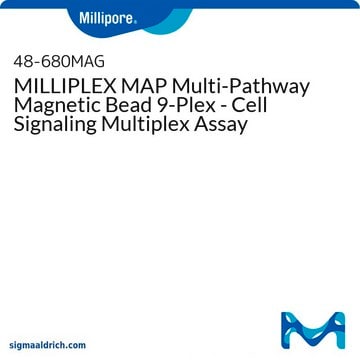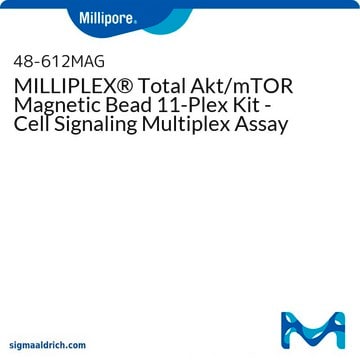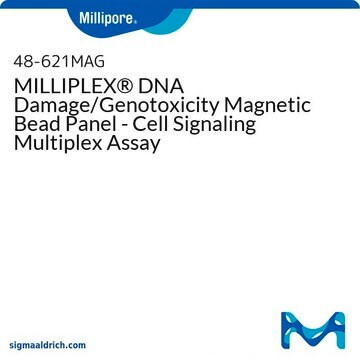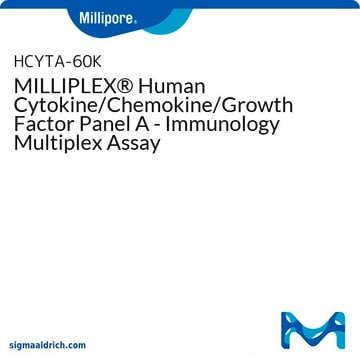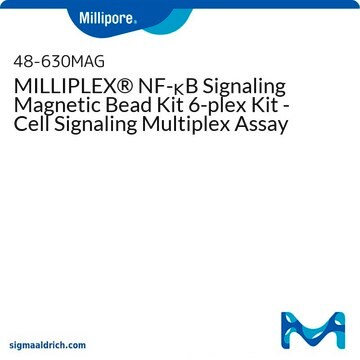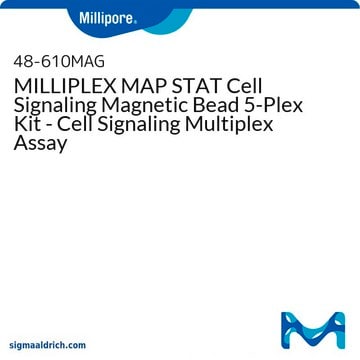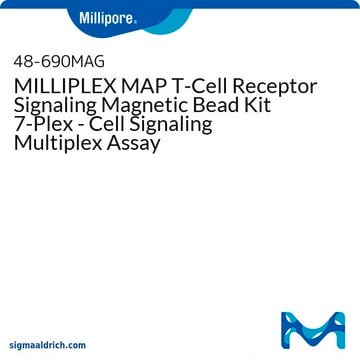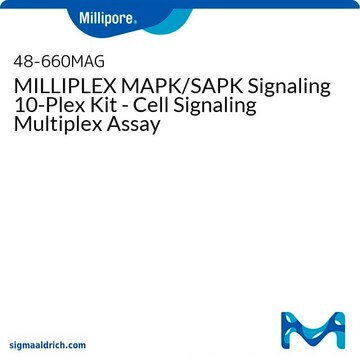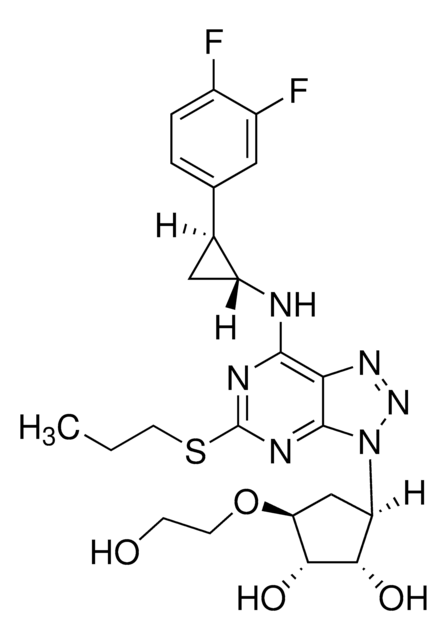48-681MAG
MILLIPLEX® Multi-Pathway Total Magnetic Bead 9-Plex - Cell Signaling Multiplex Assay
Synonym(s):
Luminex® Cell Signaling Assay, Millipore Cell Signaling Assay, Signal Transduction Panel
Sign Into View Organizational & Contract Pricing
All Photos(1)
About This Item
UNSPSC Code:
12161503
NACRES:
NA.47
Recommended Products
species reactivity
human, mouse, rat
Quality Level
manufacturer/tradename
Milliplex®
technique(s)
multiplexing: suitable
detection method
fluorometric (Luminex® xMAP®)
storage temp.
2-8°C
General description
The MILLIPLEX® ColA MAP 9-plex Multi-Pathway Total Magnetic Bead kit is used to detect total protein levels for ERK/MAP kinase 1/2, Akt, STAT3, JNK, p70 S6 kinase, NFκB, STAT5A/B, CREB, and p38 in cell lysates using the Luminex® xMAP technology. The detection assay is a rapid, convenient alternative to Western Blotting and immunoprecipitation procedures. Each kit has sufficient reagents for one 96-well plate assay.
Specificity
Cross-reactivity between the antibodies and any of the other analytes in this panel is non-detectable or negligible.
Application
Intracellular Bead-Based Multiplex Assays using the Luminex technology enables the simultaneous relative quantitation of multiple phosphorylation and total pathway proteins in tissue and cell lysate samples. Compare Multiplexing results to those of Western blotting.Analytes available:Erk/MAPK 1/2 (Total);Akt (Total);STAT3 (Total);JNK (Total);p70 S6 Kinase (Total);NFκB (Total);STAT5A/B (Total);CREB (Total);p38 (Total)
Storage and Stability
Recommended storage for kit components is 2 - 8°C
Legal Information
Luminex is a registered trademark of Luminex Corp
MILLIPLEX is a registered trademark of Merck KGaA, Darmstadt, Germany
xMAP is a registered trademark of Luminex Corp
Disclaimer
Unless otherwise stated in our catalog or other company documentation accompanying the product(s), our products are intended for research use only and are not to be used for any other purpose, which includes but is not limited to, unauthorized commercial uses, in vitro diagnostic uses, ex vivo or in vivo therapeutic uses or any type of consumption or application to humans or animals.
Signal Word
Danger
Hazard Statements
Precautionary Statements
Hazard Classifications
Acute Tox. 4 Oral - Aquatic Acute 1 - Aquatic Chronic 2 - Eye Dam. 1 - Skin Irrit. 2
Storage Class Code
10 - Combustible liquids
Certificates of Analysis (COA)
Search for Certificates of Analysis (COA) by entering the products Lot/Batch Number. Lot and Batch Numbers can be found on a product’s label following the words ‘Lot’ or ‘Batch’.
Already Own This Product?
Find documentation for the products that you have recently purchased in the Document Library.
Poonam Naik et al.
Translational vision science & technology, 10(9), 26-26 (2021-08-24)
Infections with multidrug-resistant Pseudomonas aeruginosa (MDR-PA) lead to poor clinical outcomes in endophthalmitis patients, and its interactions with the host immune system remain largely unknown. The current study aimed to determine the association of MDR-PA infection with the cytokine expression
Fabrízio Dos Santos Cardoso et al.
Frontiers in cellular neuroscience, 15, 683127-683127 (2021-09-21)
Aging is often accompanied by exacerbated activation of cell death-related signaling pathways and decreased energy metabolism. We hypothesized that transcranial near-infrared laser may increase intracellular signaling pathways beneficial to aging brains, such as those that regulate brain cell proliferation, apoptosis
James P McNamee et al.
International journal of radiation biology, 97(9), 1316-1323 (2021-05-29)
To assess the effects of 1800 MHz radiofrequency electromagnetic field (RF-EMF) exposure on the expression of signal transduction and antioxidant proteins in a human-derived A172 glioblastoma cell line. Adherent human-derived A172 glioblastoma cells (1.0 × 105 cells per 35 mm culture dish, containing 2 mL
Alyson L Essex et al.
Biology of sex differences, 13(1), 56-56 (2022-10-02)
Osteocytic microRNA21 (miR21) removal alters cytokine production and bone mass by modulating osteoclast and osteoblast differentiation and activity. Removing osteocytic miR21 increases osteoclast/osteoblast numbers and bone mass in male mice, whereas it decreases osteoclasts/osteoblasts without affecting bone mass in female
Tania Quesada-López et al.
Nature communications, 7, 13479-13479 (2016-11-18)
The thermogenic activity of brown adipose tissue (BAT) and browning of white adipose tissue are important components of energy expenditure. Here we show that GPR120, a receptor for polyunsaturated fatty acids, promotes brown fat activation. Using RNA-seq to analyse mouse
Our team of scientists has experience in all areas of research including Life Science, Material Science, Chemical Synthesis, Chromatography, Analytical and many others.
Contact Technical Service